INTERVIEW. Mikalai Statkevich: Lukashenka Would Chicken To Fight In Manly Way
- 1.05.2018, 20:46
- 12,735
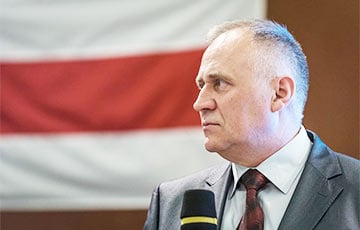
The Square remains the only way to change the rules of the game.
Leader of the Belarusian National Congress Mikalai Statkevich gave an interview to Charter97.org in the framework of the "Iron People of Belarus" project.
- Describing the clash with the masked people on December 19, 2010, you said: "My scull, hardened in the many generations of the noble, sustained the blow." On your website, there is information that you originate from the noble family of the Statkevichs who had the "Kostesha" coat-of-arms. When did you learn this? Have you studied archive data?
- I learned this from my parents. My father grew up in the noble settlement of Piatnitsy near Slutsk. Now the settlement is abandoned, but it was once inhabited by the offspring of the noble who remembered their origin.
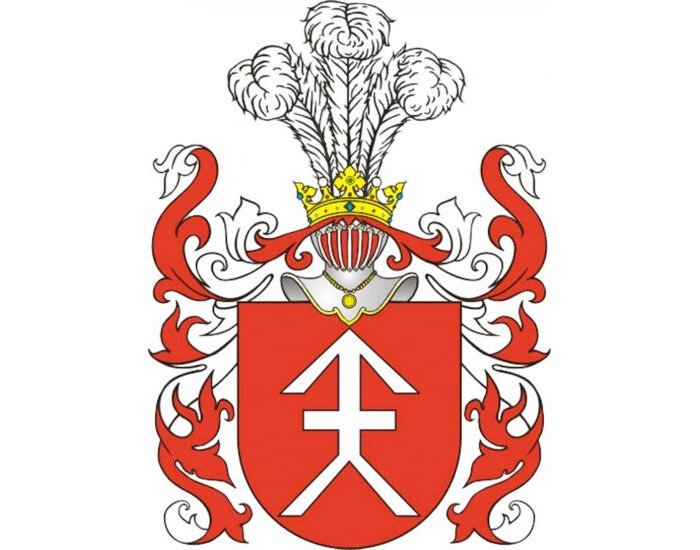
Piatnitsy differed from the surrounding villages. Even the houses there are placed in a circle, and there's only one entrance. This is very convenient in terms of defense. There used to be a very good land, good horses, no one used alcohol when grooming the graves on Tuesday after Quasimodo.
My mother comes from the settlement of Chaplichy, which is located in the neighbourhood. She is from the family of the Valadkovichs. Her family is older than the Statkevichs, but they preserved their positions better. For instance, they never even faced the question of confirmation of noblesse in the Russian Empire.
As for my great-grandfather by father, he had to prove the nobility before the Russian authorities for a long time. One letter helped. My ancestor Ivan exchanged the lands with Mikalai Radziwill Chorny. Ivan's lands were located right by the walls of the old Radziwill, then still wooden, palace. The exchange was made for several plots of land in other regions - so my father's ancestors came to the Slutsk district.
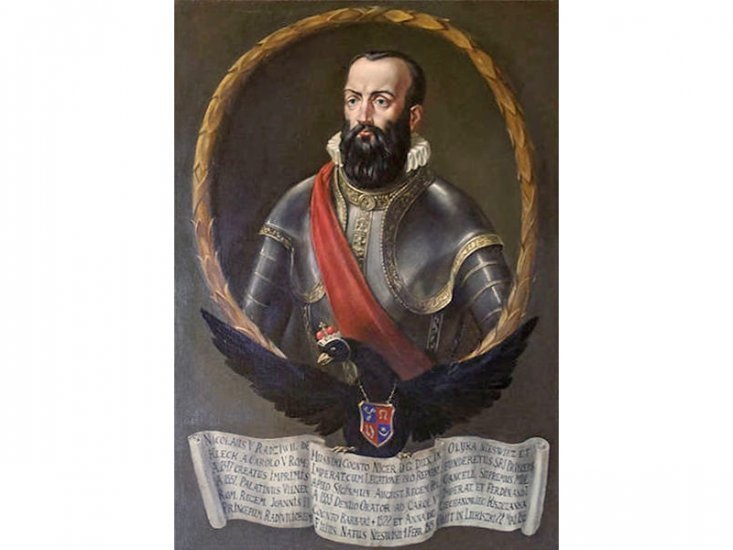
I come from a rather rare family who preserved the Orthodox religion. I come form the Orthodox noble. My ancestors were philanthropists, military men - there's a significant trace in the history.
For example, ancestor Ivan represented Samogitia in the drafting committee for the creation of the GDL Statute in 1566. Besides, ancestor by mother Marcin Valadkovich was a secretary of that committee. He and Yefstafiy Valovich (GDL Deputy Chancellor - Charter97.org) achieved that the Statute should be in the old Belarusian language, not in Polish.
My mother's situation with the ancestral tree is a little more complicated. In the 1930s, her mother married the chairman of the village council, Siamion Horbavets. He was from Western Belarus, participated there in the Communist underground, was arrested, escaped, was sentenced to death in absentia, escaped again - already in the BSSR. Here, he became the chairman of the rural council. In 1937 he was arrested and tortured, and then killed during interrogation in the Slutsk prison of the NKVD, because he resisted when he was beaten.
In the 1930s, my ancestors concealed their origins. I remember stories about how the patents of nobility were burnt. And my father's grandfather tried not to live in Piatnitsy - he got a job at the MTS (machine and tractor station at the collective farm - Charter97.org), so that he was not subjected as a "hostile element".
During the German occupation, my grandfather tried to cause harm to the Nazis. My father told me how they sawed the telephone poles together with him, but they were spotted by the detachment of the German soldiers. They managed to escape - galloped on horses, they had good horses. But when the Germans retreated, the policemen from the neighboring village came to my grandfather, offered him to retreat, he refused and they killed him in the eyes of his family. My father was hiding in the garden. After the shots the sentry found him - he was beaten, but left to live.
After the arrival of the Soviet Army, his father went there as a 17-year-old volunteer - and this again saved his life. His classmates and friends, who were mobilized at the age of 18, all died, because Belarusians who were under occupation were considered unreliable and untrained to be thrown on German machine guns in Prussia. And my father was in the military school and did not make it to go to the front.
- You said there were philantropists among your ancestors. Has any trace of their activity remained in the current Belarus?
- Yes. For example, the St. Peter and Paul Church on Niamiha in Minsk was built in 1612 for the money of Bogdan Statkevich. This is the brother of the ancestor Ivan, who exchanged the lands with Mikalai Radziwill Chorny. Earlier there was a sign at the entrance, with the inscription that the church was built for Bogdan Statkevich's money by his wife. Bogdan built not only the church on Niamiha. The Kuteina Lavra near Vorsha is also his foundation.
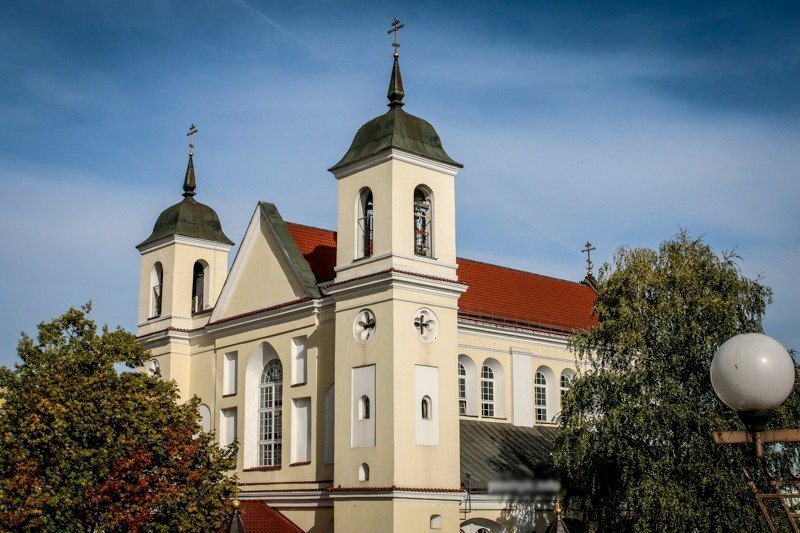
Now in the church on Niamiha, they hang a new memorial shield - the name of Bogdan Statkevich was hidden among dozens of other small donors on the back side of the shield. I understand this fear of power, but there must be some kind of gratitude towards the family, who defended Orthodoxy in difficult times.
- What a glorious family history... Are you the only offspring left? Do you have brothers or sisters? What are they up to?
- I have an elder brother, Aliaksandr. He met a girl from Lviv in the Soviet times, Oksana. He fell in love with her and moved to Lviv, where he still lives.
He is engaged in business. True, he had problems because of me after 2010. As far as I understand, there was very close cooperation between the SBU and the KGB then (I do not know how it is now). As I understand it, at the orders of the special services, the bank with which my brother worked for a long time, did everything possible to bankrupt him.
While I was in prison (after the elections of 2010 - Charter97.org), my brother had a difficult period, but now he got out of this situation. My brother is a patriot of Belarus, he takes our situation close to the heart. And in general we, as brothers, love and support each other.
- What kind of business does your brother own, if it's not a secret?
- He dealt with building materials, there was a Ukrainian branch of "Sniezska". Unfortunately, he was forced to sell that business after 2010. Now he is engaged in other projects, connected with the supply of Ukrainian products to the European market.
- You grew up in the family of teachers. What subjects did your parents teach?
- My father taught history, and my mother taught the Russian language and literature.
As for me, I resemble my mother's family line, the Valadkovichs, by character and constitution. Being in the KGB remand prison after the election of 2010, I read the book about Marcin Valadkovich. He had an interesting incident with Ivan the Terrible.
- Someone brought a book about your ancestor to the remand prison of the KGB?
- Actually it was just a magazine "Around the World". I opened it - and found the story of how Marcin Valadkovich went to Ivan the Terrible with a mission of an ambassador. The tsar after the conversation with him was furious, but he could not kill the ambassador, so he simply forbade giving him to eat and drink until my ancestor left the limits of Muscovy.
His features were transmitted on the maternal line. Mother entered postgraduate school as a village teacher, and wrote a thesis. But she was not lucky - the supervisor died and no one helped with the publications. But the fact is that the thesis was written.
Mother in general was an extraordinary, strong, educated person. We always had a huge library, including Russian classics. My brother and I read a lot since childhood.
My father often recalled that late at night, while my parents were preparing to study in the workroom, we crawled with books to a strip of light from their door, lay down there and read.
I read a lot in my childhood, and now I read a lot. Books, perhaps, are my favorite hobby.
- Was literature your favourite subject at school?
- Strange as it may seem, it wasn't. I simply did not perceive all these "a ray of light in the darkness". I don't say I liked all books. My favourite subject was maths. I love the exactness of thinking and logic.
- Have you finished school with honours?
- No, I had two 4s - in geography and astronomy. Herein, I was good at geography, I loved maps, and knew the capitals of all countries in the world since early years.
The fact is that there was a conflict in the teachers' team. A woman who taught geography and astronomy, and my father experienced mutual hostility. Because her first husband was the chief of the same police who killed my grandfather.
In the end, no matter how good my answers in geography were, I got a 4. The same with astronomy. My mother was upset and wanted to fail the daughter of that teacher in literature, but I asked her not to, so the girl got a 5 in literature.
- In the early 90's, when the white-red-white flag was the state flag, and Belarus gained independence, some of my friends wanted to be military - but they refused this idea after Lukashenka came. And why did you decide to become a military man - was it really to protect the "great country" from Brest to the Kuril Islands?
- There were two factors.
The first one was my aunt's husband, who graduated from the Minsk Higher Engineering Air Defense Missile College. It was a prestigious higher military-technical education for Soviet times. In the last year, before the assignment, he invited me to his place and made a kind of "advertisement" to this school.
On the other hand, the Soviet society was very overregulated and even feminized. Men in many professions could not make decisions, were clamped inside rigid frames. So I imagined: I'll go somewhere, get a higher education and become an employee of some office, on which nothing depends. I did not like this life at all, it did not correspond with my energy. It seemed to me uninteresting and miserable.
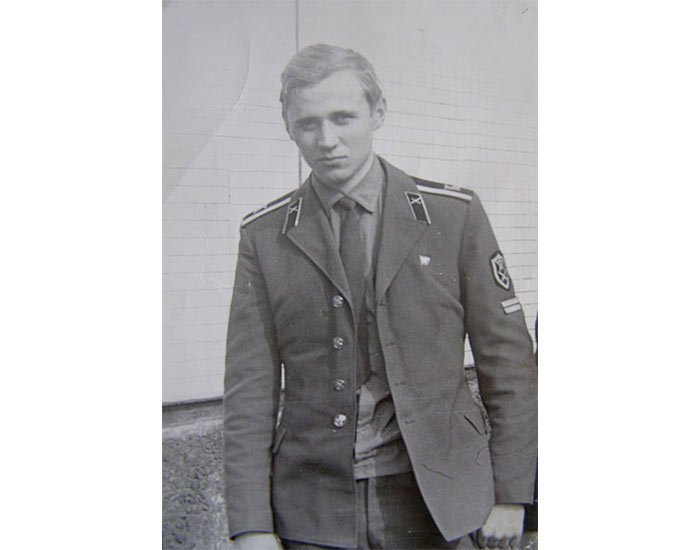
- You served in the army beyond the Arctic Circle, in the Murmansk region. What was the attitude of the superiors to the Belarusian officer? Moreover, the one who came from the land of the rebels, the Slutsk district, and had not exactly working-peasant origin?
- The attitude was normal, because everything was determined by personal qualities and professionalism. Of course, I could not tolerate rudeness and rebuffed, despite the ranks. I demanded respect for myself - but I respected others.
I can say that the relationship with the supervisors was not easy, but generally positive. When the question arose about the admission to the military postgraduate study, some of my superiors did not want to let me go. But after the lecture on "inadmissibility of parochialism in the interests of the cause" I was allowed to enter there.
I had problems with another institution, which is called a special department. This is the military counter-intelligence service of the KGB in the army. With them, I had several conflicts, and then I realized that the head of this department was probably not such a bad person, because he could have irretrievably ruined my career.
It all started when soldiers began coming to me complaining that one of them was being recruited and forced to rat everybody out. I was supposed to protect this soldier. I remember this conversation as if it was yesterday, the head of th especial department came and I told him: "You talk with my soldier, and his comrades-in-arms start casting him sideway looks and think that he is your rat. He is a good specialist, I want to promote him for the position of a sergeant, and you damage his reputation." The special department officer said: "Did he tell you about this?" "Nope, - I said, - I guessed it as I saw you talking to him." He suggested we should go outside of the batcher, there was some ceremonial review with the participation of officers. "Imagine what they are thinking about you know, seeing us talking. However, you are not a rat." However, after this incident the special department left the soldier alone.
- Napoleon liked to say that there is marchal's baton in the knapsack of every soldier. Honestly - to what rank did you want to serve?
- You know, I also thought about this a lot - to what rank I can serve.
You see, there was such a system in the army: if you want to make a career, you have to leave the engineers for a purely command post, go to the General Staff Academy, head divisions and so on.
When high bosses came to our unit, I saw quite many smart, energetic leaders among them. But when a major was appointed as chief of staff, on a colonel position, only because he had an uncle who was a colonel-general, and this not very clever, rude, boorish person began to humiliate his colleagues - I realized that making a career in the Soviet army, where everything rested on the ties and patronage, was way too risky. After all, anything can happen. I met such officers who, at the age of 30, thanks to personal qualities, were already colonels, and then some soldier would receive a letter from a girl who dumped him, would shoot himself then - and without protection the career was ended after a couple of such incidnets. And no one is immune to such stuff.
I realized that I could not compete with the generals' relatives, and decided to go somewhere where my career depended more on me. Back in the school, I was engaged in military research. Then I was the first in the school to do laboratory work on computers. I saw the shortcomings of the technique and, although it was forbidden, made changes to it to make it more convenient to work. I really liked this combination - man and machine, and I tried to facilitate their interaction.
Therefore, I decided to enter the post graduate military course. In the Soviet Army, this was considered impossible without patronage. But just for the internship we got a graduate from the Department of ACS (Automated Control Systems - Charter97.org) from Minsk, who told that the department was headed by a new chief, and he really needs intelligent specialists. There was a chance to enter the course.
Of course, in military science, the career ceiling is the rank of a colonel. But in the scientific sphere one can become a corresponding member of the Academy of Sciences.
The school still remembered my laboratory work on computers, it was even studied by other cadets. Thanks to this, as well as to two people - my real and official scientific supervisors - I was able to enter the post graduate military course and began to work on my Ph.D. thesis.
- How did you, a senior officer of the Soviet Army, with good career prospects in the military science, come to the idea of Belarusian patriotism?
- I guess there have been certain seeds of patriotism in my soul. I remember the impression that "Pesniary" band made on me. The Soviet school program in history somehow caused a feeling of depressionb, like, we, Belarusians, are not a proper nation, we have nothing. This is unnatural for a person to live with such emptiness inside. So, I searched for the way out everywhere, even in the Belarusian pop songs.
When I left to the North to serve in the army there, I took with me several books in the Belarusian language. But this was not enough, I felt some inner imbalance. I remember, when I was on vacation I bought a book by Uladzimir Karatkevich - this was the next step on the way to Belarusian patriotism.
Later, when I was studying in the post graduate military course in Minsk, my neighbor in the communal apartment was Mikalai Verakou. He was the first to offer me the book by Kanstantsin Tarasau "Pursuit to Grunwald." We began to communicate on this topic - and this book, and conversations had a shock effect. It turns out that the Belarusians had a glorious history!
Then, when perestroika and glasnost began, the information started flowing as a continuous stream. Pride has arisen for belonging to the Belarusian people. At the same time, there was an outcry over the fact that all this had been kept for so many years under the ban and our people were so rudely manipulated.
And I am such person: if I know something and don't like it, I consider it my duty to change it. We actively discussed these topics with Mikalai, then gradually switched to the Belarusian language of communication.
We also started talking Belarusian with my first wife. In Soviet times this was a terrible secret. I remember already literally before gaining independence, I dared to speak in the Belarusian language with my wife on the phone from the office at the department. My colleagues, like the military intelligentsia - all but one, rose and left in protest.
It should also be taken into account that the sphere of my professional interests was man-machine systems. I was forced to deal a person not only from the point of view of engineering, but also from the standpoint of social psychology. Because I have seen how much the people's motives affect the performance of their managing functions. Debating on these topics with Mikalai and another person in the rank of colonel (I do not want to mention his name so as not to harm him), we came to the conclusion that the USSR would necessarily collapse - because it did not have a unifying idea.
Glasnost had destroyed the communist platform, which meant that Belarusians had a chance to become independent. Analyzing this, we came to the conclusion: if the disintegration of the USSR begins, then the unifying mechanism-the army and the security forces-can work. The reflex of the army, if a common country disintegrates, is to keep it by the methods that it knows. And if the army at the time of the collapse of the USSR is not divided, then a civil war can begin. And I came to the conclusion that we must prepare public opinion for the fact that the army must be divided.
In the beginning of 1990 I wrote an article on this topic and signed it with the name and surname of my grandfather, who was killed by the NKVD - "Siamion Harbavets". The article was called "Do we need national troops?". This material I gave to the most democratic at that time Belarusian newspaper "Litaratura i mastatstva", headed by Anatol Viartsinski. For several months the magazine was afraid to publish the article and it came out only in the summer of 1990.
Then the elections to the Supreme Soviet were already held, and there was a faction of the Belarusian Popular Front. I expected that politicians would take up this topic. But the article was one-time - that's all. Then in the fall of 1990, under the same pseudonym, I published a more radical material, "Where and how Belarusians should serve." But the topic wasn't voiced in the Supreme Council again.
In December 1990, an initiative group for the creation of the Belarusian Social Democratic Hramada (BSDH) was formed. There were Anatol Viartsinski, Mikhas Tkachou, deputies of the Supreme Council. I realized that I would have to create the national army myself and joined this group with the help of Anatol Viartsinski. To implement the concept of the Belarusian army, a party was needed, and the Social Democracy attracted me in spirit. Secondly, the BSDH had access to the press and deputies in the parliament to constantly voice the military theme.
First I was in the underground, as , like any senior officer, I was supposed to be a member of the Communist Party. However, when they started running people over with tanks in January 1991 in Vilnius neart he TV-center, I decided to "walk out of the shadows", as they say. So I put the Communist party membership card on the table before the Congress of the BSDH in late winter in 1991.
In the BSDH, we organized a group of supporters of the creation of the Belarusian army. Back then, I already defended my Ph.D. thesis and entered doctoral studies. Using scientific trips, I managed to drive through the regions of the Soviet Union, where Belarusian officers started to get in touch with me: Vikentsiy Chorny, Stanislau Sudnik from Kazakhstan, Siarhei Chyslau, who retired from the army in the rank of a lieutenant. A stable team began to form.
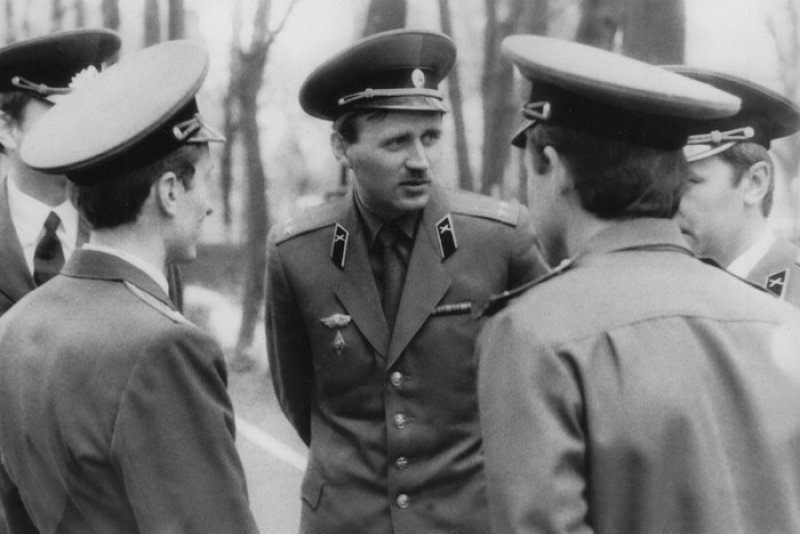
At first we created a group of military men who were members and supporters of the BSDH. But other Belarusian parties developed and they also had reserve soldiers. So the idea arose to create a non-partisan military organization. The idea to proclaim such an organization was planned for the fall of 1991.
At the same time they made it clear that in the fall I would have a report on my Ph.D thesis and it would probably be declined. However, I expected this.
Still, in August, a reactionary putsch occurred - the transfer of power to the State Committee on the State of Emergency was announced. I made a decision: if they did not come to arrest me that night, there's still a day or two. For the future of our nation in those days it was very important that someone in the uniforms announced our rights to self-determination and sovereignty. It was necessary to set an example of decent behavior.
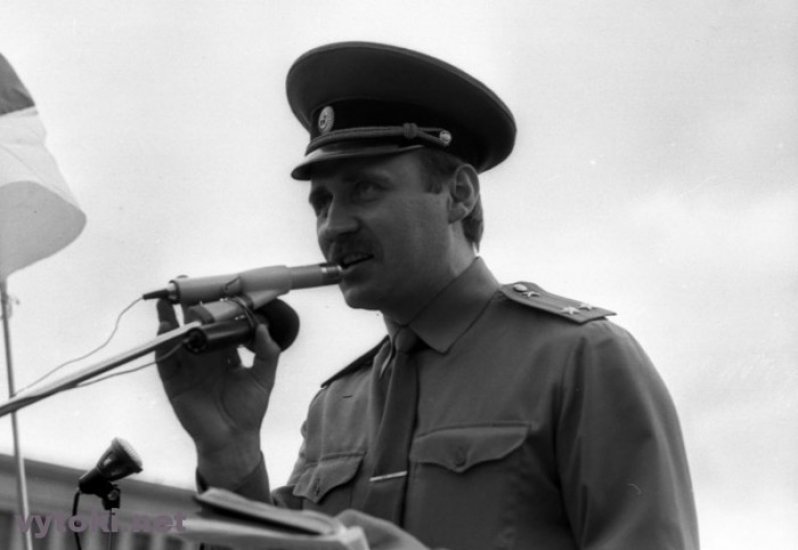
Therefore, I came to the meeting of the opposition parties and there I suggested to the servicemen of the reserve to announce the creation of a military organization. We made this decision and on August 20, 1991 we came together. There were 2 career officers - me and another major, who soon left the meeting, considering our plans too bold. The rest were reserve officers. And that day we announced the creation of the Belarusian Union of the Military.
The Birth of Belarusian Union of the Military, August 20, 1991
The Belarusian Union of the Military addressed to soldiers and officers of the Belarusian military district so that they did not carry out the orders of the the State Committee on the State of Emergency and did not shoot people. We also prepared an appeal on behalf of the Belarusian Union of the Military on the creation of the Belarusian army as a guarantor of our country's independence. With this appeal I came to the faction of the BPF of the Supreme Council, which included the Social Democrats, and also spoke at the rally. But this was not enough - it was necessary to speak in mass media.
For this I am very grateful to Vital Siamashka, who then hosted a musical youth program on the Belarusian Radio. He saw me and asked me to speak. I remember how we recorded my appeal in the studio on the Chyrvonaya Street. We had to re-record it three times: we recorded it with tape recorders, the technician's hands were shaking and he kept on tearing the tape. And the boss was running in and out of the room shouting: "They'll kill you with sapper blades!". But thanks to this, when the appeal went to the air it was nearly perfect.
I understood perfectly well what I was up to, especially since I had two daughters growing up. One was then 7 years old, the other was 11. But simultaneously with the fear for the loved ones there was a feeling of some kind of happiness: I did everything I could. On August 20, we set up reserve officers near the military units, agreed on the alert system in case the soldiers were led to the center of the city. With the help of free trade unions, we printed out our appeal in the form of leaflets and distributed them among the military.
For tomorrow I was summoned to the military school. Despite the vacation, all the authorities gathered there. The officers of the special department were also summoned. I asked them directly: "Are you ready to shoot at the people?". They began to swear that they would not do it. "You know, I could have stayed at home, but I came to study your moods. I am satisfied, " - I answered them. They were just in shock.
I went home, and a few hours later the chief of the political department called me and said: "Mikalai Viktaravich, my congratulations - the junta is falling." I was laughing so hard.
And then, after all this, I learned that at the time of my call to the school, in fact, a criminal case was initiated against me under the article "treason to the motherland".
- How did you know about this?
- This story is a lesson for all the current law-enforcers and" fighters of the invisible front." After the failure of the coup, phones were published and a wave of denunciations began. The State Emergency Committee sustained for only two days - and the number of denunciations was huge. Power structures began to rat each other out. They called me and told me who initiated the criminal case in the military prosecutor's office.
So in the fall of 1991, they failed to expel me from doctoral studies. Moreover, we in the Belarusian Union of the Military managed to prepare the first draft laws on the creation of the Belarusian army. We hurried, as we saw that the forecast for the collapse of the USSR was coming true.
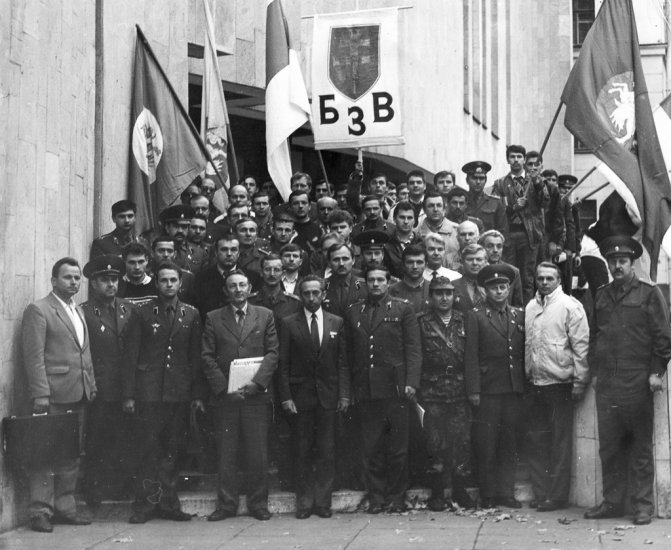
Our plan was to subordinate the Belarusian military district and not to use it against independence. We brought these draft bills to the BPF faction in the Supreme Council, where they "combed" them and set up a commission for defense and security, headed by Mieczyslaw Hryb.
- How did other deputies, not from the Belarusian Popular Front faction, take the idea of creating the Belarusian army?
- It was a complicated process. Many simply were not ready for it.
One day, when I came to the meeting, I saw how one big deputy with a strange hairdo running among the overweight chairmen of the collective farms who read the newspaper "Two" (the newspaper of intimate and entertaining content in the 1990s, Charter97.org) and convinced them of something .
And when the bill on creating the army was considered, I approached him and found out that his name was Aliaksandr Lukashenka. I asked him to support the bill. He looked suspiciously at me and fiercely opposed. Three times this bill failed, and only in 1992 the law on the creation of the Belarusian army was adopted.
It was very risky: a conspiracy began in the Soviet army, which was headed by the chief of the General Staff. Ukraine decided to create its own army, but it was not recognized by the Russian Federation, headed by Yeltsin. And only when the Supreme Council of Belarus decided to create an army - Moscow trembled and negotiations began on the division of the Soviet army.
- Poet Kanstantsin Mikheyeu wrote the following words in the poem about military duty: "Whom, why and how did you swear, you remember yourself, be reconciled and be a man." And to whom Mikalai Statkevich swore an oath?
- Like any military man in the USSR, I took the oath to the Soviet Army. However, such an army and country ceased to exist - the question arose about swearing in to the Belarusian state and its armed forces.
New soldiers-conscripts began to swear allegiance to the Republic of Belarus. But most of the officers of the former Belarusian Military District came from other regions of the USSR and categorically did not want to swear allegiance to Belarus.
The Belarusian Union of the Military proposed to hold a public action: take the oath in public, in the Independence Square, on the anniversary of the victory at Vorsha on September 8. The public action was to encourage the Kebich government to swear in all the officers of the Belarusian army.
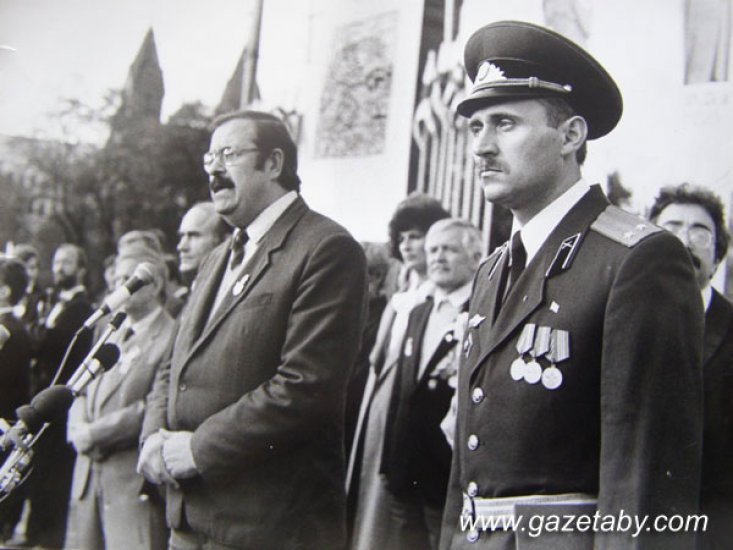
We were very much helped by the BSDH, and personally by Mikhas Tkachou, the BPF and Zianon Pazniak. They helped to formalize this action as very solemn. A symbolic oath of allegiance to Belarus was taken by 15 officers in uniform and several thousand reserve officers. And the government was forced to make concessions and begin swearing in all servicemen.
The oath for the allegiance to the independent Belarus, September 8
We had to pay for it. We were under very close attention of the executive authorities, especially since they too were under our attention. The fact is, Kebich's government, its representatives were engaged in the arms trade - and in those countries, where it was banned to ship weapons, the countries at war. They shipped also portable MANPADS, with which it was possible to shoot down a civilian aircraft. We wrote and talked about this - and they started hunting down the officers of the Belarusian Union of the Military.
And, unfortunately, we were loyal to the faction of the Belarusian Popular Front in the Supreme Council. For some reason, the growth of our organization, its attractiveness worried the BPF party a lot. The Kebich government introduced a bill to prohibit servicemen from engaging in any socio-political activity. And this bill was adopted with the support of the BPF faction. With the exception of two Social-Democrats, representatives of the Belarusian Union of the Military in the BPF faction - Vital Malashka and Leanid Deiko, who voted against. And they told about the very strong pressure on them by Zianon Pazniak.
The March of the Belarusian Union of the Military, March 21, 1993
We were forced to withdraw all career officers from the Belarusian Union of the Military. However, it did not save many of them from the dismissal from the army. As chairman of the organization, I could not take this step. This would mean to recognize the correctness of those who prepared such a law - and I remained to serve. And then the Kebich government signed an agreement on Belarus joining the CSTO (Collective Security Treaty Organization). There was a very dangerous point: the participants of the treaty were supposed to send soldiers to help each other. I could not remain silent in this case - and signed a statement against Belarus joining the treaty in this form. And my appeal was used to involve a new law on the status of servicemen. For three days I was fired from the army with a very unpleasant formulation "for discrediting the high rank of an officer." At the same time for all the time of service I did not have a single penalty.
My dismissal was caused both by the protest rally and the discussion in the Supreme Council. But the main result was that the Collective Security Treaty was signed with the withdrawal of an item on sending Belarusian soldiers to participate in hostilities at the territory of other countries. And this exemption operated for more than 20 years. For the sake of this, it was worth sacrificing both a military career and a PhD thesis, which they did not let me defend. So I was pushed into pure politics.
- Then we have a question to you as a politician. Tell us honestly - was there a chance to remove Lukashenka from power back in 1994-1995 while he didn't strengthen himself there?
- First, there was an option not to let him to power. By and large, a society that survived the stress of transformation in 1994 chose between two politicians - Lukashenka and Pazniak. For ordinary people in factories who did not perceive Kebich, the question of the future was connected with the choice between these two people. This in itself was risky - we needed a third figure. Henadz Karpenka could become such a man. In my opinion, he had the greatest chances to become president.
But some of his 100 000 signatures needed for registration were rejected by Kebich's people in election commissions.
Pazniak also had a chance to go to the second round with Lukashenka, but, unfortunately, the BPF leadership turned to not quite the topics that the people were worried about in 1994. And the words of Mr. Pazniak about the role of Russia in our history, absolutely fair, were distorted by propaganda and worked against him.
But even after the elections there were chances to remove Lukashenka from power. Not immediately, but in a couple of years, when he showed his essence, and deceived voters it became clear that "there will be no miracle." And the mechanism of his removal from office was more effective then. I mean the street, street protests, which were then more massive.
- However, there were other options apart from the street actions, as in 1996 the impeachment to Lukashenka was being prepared officially. You headed the BSDH in that very year. Have you participated int he process of impeachment?
- Of course, the Social-Democratic faction in the parliament participated in this, our deputies signed the impeachment. But here we dealt with the treachery of the head of the Constitutional Court Valer Tsikhinia, and with the intimidation of the deputies who were forced to withdraw the signatures, and with the influence of Russia, which sent its politicians for negotiations.
I tried to organize protests and came to the chairman of the Supreme Council Siamion Sharetski. However, on the eve the KGB spread "compromising evidence" against me among the deputies - the "information" that I allegedly worked with the KGB. And for some reason, such a clumsy, crude, ridiculous provocation was taken seriously by Sharetski. I saw only silence and mistrust on his part. Moreover, he said that we must disperse, there will be no protests, everything should be "according to the law".
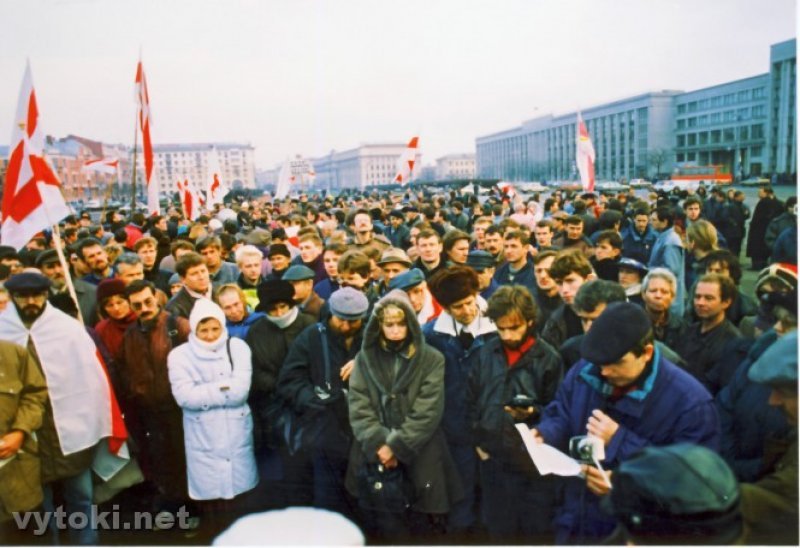
As a result, I organized an action against an unconstitutional referendum on November 24, 1996, only when it had already passed. And I found myself on my first 15-day arrest, and announced the first hunger strike.
- Almost 22 years have passed since then, 8 of which you spent behind bars, on aggregate. Do you have there's something personal about this? Some subsoncious, irrational hostility between Lukashenka and you?
- For my part, there is no personal dislike for Lukashenka. I think this is just his irrational hostility to me.
I try never to struggle "against". We must always struggle for. "Against" is always secondary. And in general: I do not feel hatred for anyone. And any wise person knows this: if you are in a closed prison, especially alone, for years with a feeling of hatred, then you will simply physically kill yourself.
I have no hostility or desire for revenge. Probably, I am motivated by a sense of responsibility and duty genetically assimilated from my ancestors - before the community and the country.
And personally I have nothing to Lukashenka. Sometimes I make tough statements about this person, but just because it's true. And also in order to reduce the level of fear in the society. When someone speaks absolute hard truth about Lukashenka - people see it and they are not so scared anymore.
- You said Lukashenka could have some personal dislike for you. Why?
- There was one personal moment which I would not like to recall.
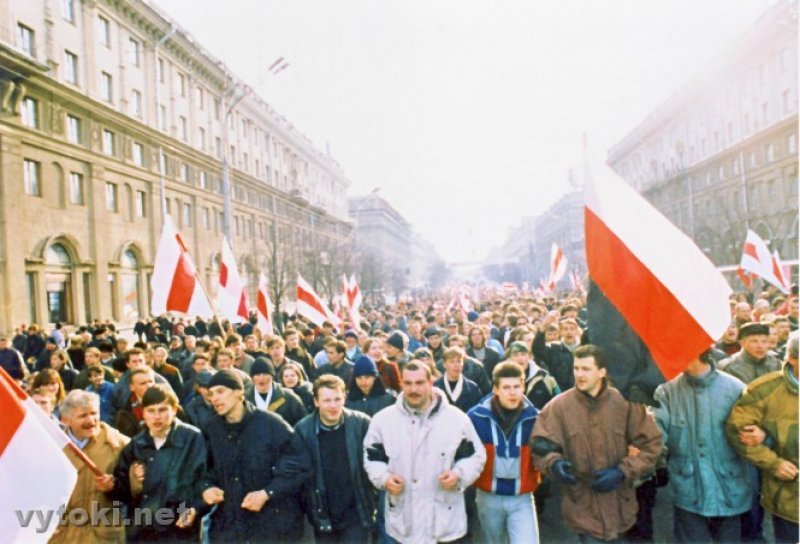
- If all this happened in the era of simpler relations in the society, would he had been brave enough to solve this contradiction in a manly way?
- No, this is not the person who solves the issues in this way. Lukashenka would have chickened to fight like a man.
I think he would send some hired assassins to me. Or would come to supposedly "make peace" and pour poison into the goblet with wine. That's his style.
By the way, I had to deal with the theme of the duel already during the reign of Lukashenka. In 1995, after the "referendum" to change the symbols, Azaronak's film "Hatred. Children of Lies" came out. Despite everything, I think Azaronak is a talented person. But the film was very sneaky. The technique of the of "shots interruption" was used in the film: they showed the national flag, Pazniak, me, and then they showed the policemen-collaborants.
Given that my grandfather was killed by policemen-collaborants, and my father saw this film, I considered it my duty to find this director and came to the door of his house. I asked him to come out and, simply speaking, punched him in the face. I would even be silent about it, but he sued me. But it only made it worse for him: he was recognized and beaten on the street. As a result, he started drinking.
- In 1999, you were one of the organizers of the fisrt Freedom March. The final of that action on the crossroads of the Pershamaiskaya Street and Pulikhava Street was dramatic and unexpected. Tell us, how it happened in the reality?
- In July 1999, Lukashenka ran out of five years of his cadence. At first I went to the action organized by Viktar Hanchar, and a few days later, on the Independence Day on July 27, he organized a protest action, which ended in minor clashes. At first I servd an administrative detention, and then a criminal case was opened, and I was under a written obligation not to leave the place.
However, the abductions of Lukashenka's opponents were taking place in the country, and Belarus itself was threatened with incorporation by Russia. We had to react, and with our colleagues from the "new wave" of the opposition politicians, we decided on October 17 to organize the March of Freedom. I directed this march, although I was already under criminal investigation.
Freedom March, October 17, 1999
This march ended in clashes, dozens of demonstrators were wounded, because when the police rushed to beat people, they took up the paving slab. The repair works were being carried out then ...
- Were the repair works and the slab a provocation? Did they put it there on purpose?
- No. This was not a provocation. The fact is that the route of the column was known only to me. The action took place under a rather complex scheme. The authorities had already decided to send all rallies to the Bangalore Square. They also allowed the Freedom March there.
People gathered in the Yakub Kolas Square. My colleagues and I consulted and decided that we should reach the sanctioned place, gather even more people on the road, and from there go to the center. In the Bangalore Square, there were already more than 20 thousand people under our banners . And from there we went to the center. I thought it was risky to go through the Victory Square and the bridge. Already there was an experience of previous actions: they block the road there, and the demonstration was trapped.
Memories of participants of the Freedom March on October 17, 1999
Therefore, I decided to bypass this dangerous area through the streets Pershamaiskaya and Ulyanauskaya. The Pershamaiskaya Street was under repair, and when they started beating people, they had to pick up the slab, as a matter of self-defense. I'm very sorry for all the victims, but, probably, this had a decisive effect.
Because Lukashenka was then absent for 5-6 days - in general it seemed as if he disappeared after the Freedom March. They say he was hiding in a bunker in the Astrashytski Town. And then he came out of there and stopped talking about uniting with Russia. He abandoned the plan of full incorporation and began to trade the independence of Belarus in small pieces.
And I eventually ended up in the prison in the Valadarski Street, and there these two criminal cases - for July and October 1999 - were combined. I would have remained in prison, but the OSCE summit was planned to take place in Istanbul in November, and the representative on Belarus Adrian Severin announced to Lukashenka that he would receive an invitation only if he released the people arrested after the Freedom March. And gave him a deadline - November 1.
I was on a hunger-strike for two weeks in the jail and completely unexpectedly was released. But the criminal case remained, and eventually ended in a monetary fine.
- Let us recall your participation int he electoral campaign of 2010. Why did you go to the Kalektarnaya Street on December 19, 2010. Did it seem to you it was a trap?
- I did not consider the 2010 election campaign as a way to persuade someone to vote for me, but to gather as many people in the Square as possible. This is the only way to get the government to change the rules of the game.
And with most of the candidates, I did not support any relationship, except the team of Andrei Sannikov and Uladzimir Niakliaeu. It seemed to me intuitively (and I am convinced that I was not mistaken) that Uladzimir Prakofyevich is a very sincere person. Therefore, I decided to agree with Niakliaeu on coordination of actions.
I did not have money for sound amplifying equipment in the Square and even for renting it. We agreed with Niakliaeu's headquarters that we will act in concert and I will be able to use their equipment.
We agreed to meet on December 19, 2 hours before the end of voting. But I was afraid of preventive arrest, so I refused to go to his office, which, in all likelihood, was under external supervision.
I knew that the authorities really evaluated the candidates on who could do what, as it turned out later, one of them reported on me three days before the elections, asking to arrest me.
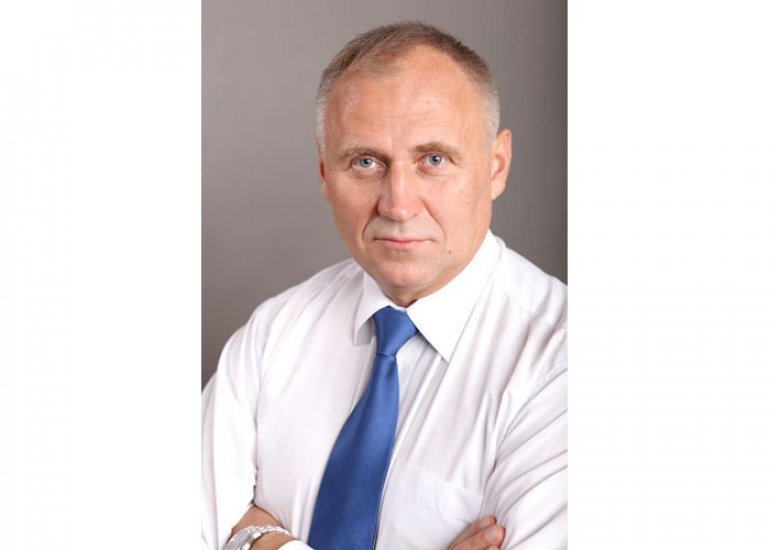
- Who was it, if this is not a secret?
- Vital Rymasheuski. I have photo copies of the protocols of his interrogations. He also denounced all the participants of the demonstration, he wrote they all violated the law. I would have refrained from saying this, but the point is I refused to sit at one table with him until he recognized this at some little website at the very least. He fulfilled my conditions on the website of the steering committee for the creating of the Belarusian Christian Democracy party. However, this interview was corrected and remains on the said website in the corrected form. Still, I now have a moral right to talk about this as he confessed publicly.
And on the day of December 19, I tried to avoid arrest and agreed to meet with Niakliaeu at one private apartment at 18.00. In the morning, my colleagues from the party organized my evacuation - I was supposed to change several cars, to prevent an external observation. I broke away from surveillance. And at 18 o'clock, together with Siarhei Martsaleu, we arrived at the specified place. But there was no Uladzimir Niakliaeu. We called him and he said he would send a car that would take me to another place. The car arrives, we got in it - and, to our surprise, we found ourselves in the Kalektarnaya Street.
We wanted to talk before the rally about uniting the opposition, creating a Rada of candidates to announce it in the Square. But it turned out that I was trapped. I did not want to discuss anything, but I thought - what to do? Leaving alone with Martsaleu - I certainly will be detained somewhere nearby. So I decided to go with the team of Niakliaeu.
Then we discussed the situation with Uladzimir Prakofyevich. My military thinking failed me. I used to think that if he is a candidate, he takes absolutely all decisions. But it turned out that many things were supervised by his chief of staff, Andrei Dzmitryeu. It seems that he planned this entire operation with my delivery to the Kalektarnaya Street, so that the Square would remain without us.
Attack on Niakiaeu and Statkevich in the Kalektarnaya Street
When I saw a minibus with equipment, which was surrounded by a couple of dozens of students, I realized that we were not going anywhere. And when the road was blocked by the police Chrysler, I immediately turned my back on it and prepared for an attack.
After that light-and-noise grenades flew and masked people appeared - apparently the special division "Almaz". Young people from the team of Niakliaeu welcomed my presence and when the attack began, one of them stood in front of me to defend. I pushed the guy away and hit the "Almaz" fighter who was beating him. He was thrown back and he called his comrades for help. I began to take the baton beatings on the forearms. Then I saw one of them crawling through the snow towards me. I could knock him out with a kick of my foot - he was a good black target in the snow, crawling head first. But I could not hit him. Then I realized that I saw in him just a Belarusian soldier, who carries out the order, and I could have killed him or crippled him with such a blow. He crawled, hit me on the knee with a baton, eventually I missed a blow to the head with a glove with a metal part and lost consciousness for a while. Still, I managed to reach the Square in the end.
- After the election-2010 you spent almost 5 years behind bars and were freed only on August 22, 2015. There are set facts that the prison administration tried to put pressure on you. How did you manage to withstand it?
- I was first sent to the Shklou penal colony. There I was listed for the penalty squad top work at a sawmill - to carry logs and load them on a saw. This was done, since the administration of the colony received direct instructions from Lukashenka, who specially visited Shklou and set the task. There were leaks and I knew about it.
I was sent to a sawmill in the hope that I will not survive this after a hunger strike. But I worked along with the younger ones. I think that they treated me with respect.
Therefore, when hard work did not help to break me, direct calls from the administration to attack me began. But people came to me, told about everything. I treat everyone with respect first, until a person proves otherwise. People feel it and respond kindly. I tried to help, passed on information, letters. I wrote a pamphlet about Lukashenka there - it went to freedom and was read, because the chief of the detachment received a reprimand from the Minister of Internal Affairs.
When they failed to break me down, they sent me to the remand prison in Mahiliou. There, people are held in the cells with fewer people than in the colony. Therefore, everything is in sight and a wide space opens up for various provocations related to the status of a prisoner. Therefore, first of all it was necessary to check neighbors, find out who is put in the cell with you.
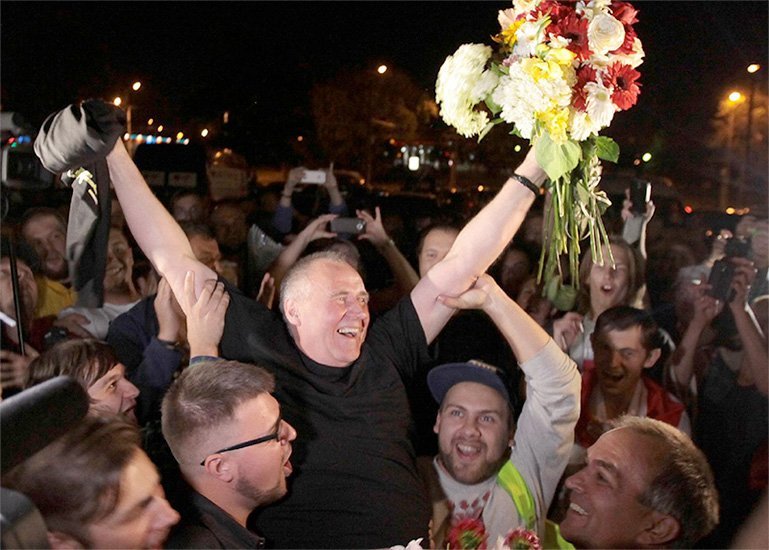
Once there was a situation when they put a person from the cell where they held HIV-infected prisoners, to my cell. It was unclear why he was there. He cut his wrists to get out. Howver, they bandaged him and put back to the cell. He had to search for another vein, and he succeeded in this - he cut himself once again and flooded everything with blood. In a word, I had to take close look to the people they put in my cell in the remand prison.
- Having gone through all these challenges, whom would you now call you friend? With whom would you go to the mountains or perform a scouting mission?
- First of all, I would call people who are close to me. This is my live friend and my wife Maryna Adamovich. I do not know how about the mountains - probably as a man, I would prefer to carry her there, but a scouting mission with her would quite possible work.
In addition, there are people with whom I am now engaged in a common struggle. As this is a struggle, I do not know if the word "friend" is appropriate here, but it would be very appropriate to go to the mountains or start a mission together. These are the people I trust: Uladzimir Niakliaeu, Andrei Sannikov, Dzmitry Bandarenka, Yauhen Afnahel.
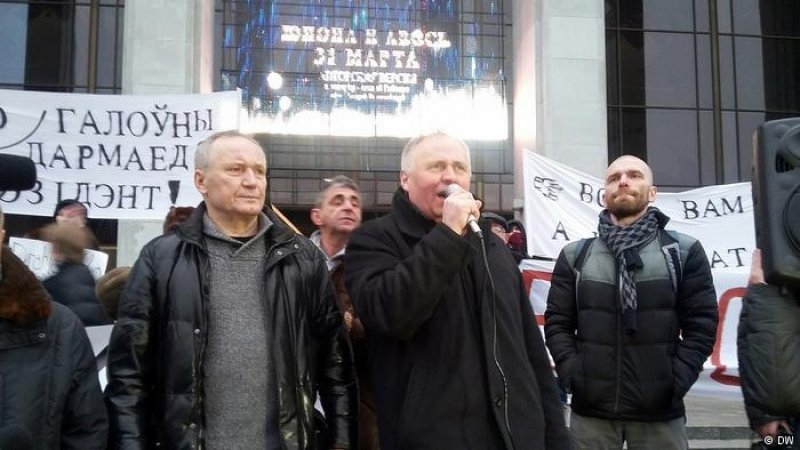
They are also people who are members of the Rada of the Belarusian National Congress. And of course - the colleagues from the BSDP (Narodnaya Hramada). Many of them are associated with such an old relationship, that you can safely use the word "friend".
- In the book by Uladzimir Karatkevich, there are the words inscripted on the holder of the dagger: "Do not take it out unless needed badly". You have been struggling with the Lukashenka regime for not one year, even not for one decade. Why do you keep believing that it will bring fruit, and continue your way?
- You see, lately there have been more and more people who recognize me in the street, come up and express their support. Trust is a duty. If people are hoping for you, you just have to stand on your own.
The human community is a very thoughtful thing. It should be attended by people of different types. This is determined, among other things, by genetics. There are people - the majority - whose purpose is simply to raise children. There is an active minority, whose task is to create some innovations, and in critical situations - to lead the society, to help them protect themselves.
There are people with a sense of social responsibility. There are not many of them, but they should be. They are called - by God or evolution, whatever they say - to ensure the survival of the community. God either rewarded, or punished me with this feeling. It simply exists. I think that it was passed on genetically. And this is good. Worse, when you live someone else's life, to which you are not called.
I feel like a part of the Belarusian nation, I understand it as it is. I see its shortcomings and virtues. But I never judge our people for being such as they are. They are my people. And one should not blame one's people, but accept them as they are. They are the best.
I just want our people, nation, state to develop. We will have to make some efforts to make life better for the country. We'll just have to be brave to make it work. Being brave is something opne can learn. Courage is a matter of training.
I hope that there will be enough people with a sense of responsibility, and together we will be able to make the country normal.








